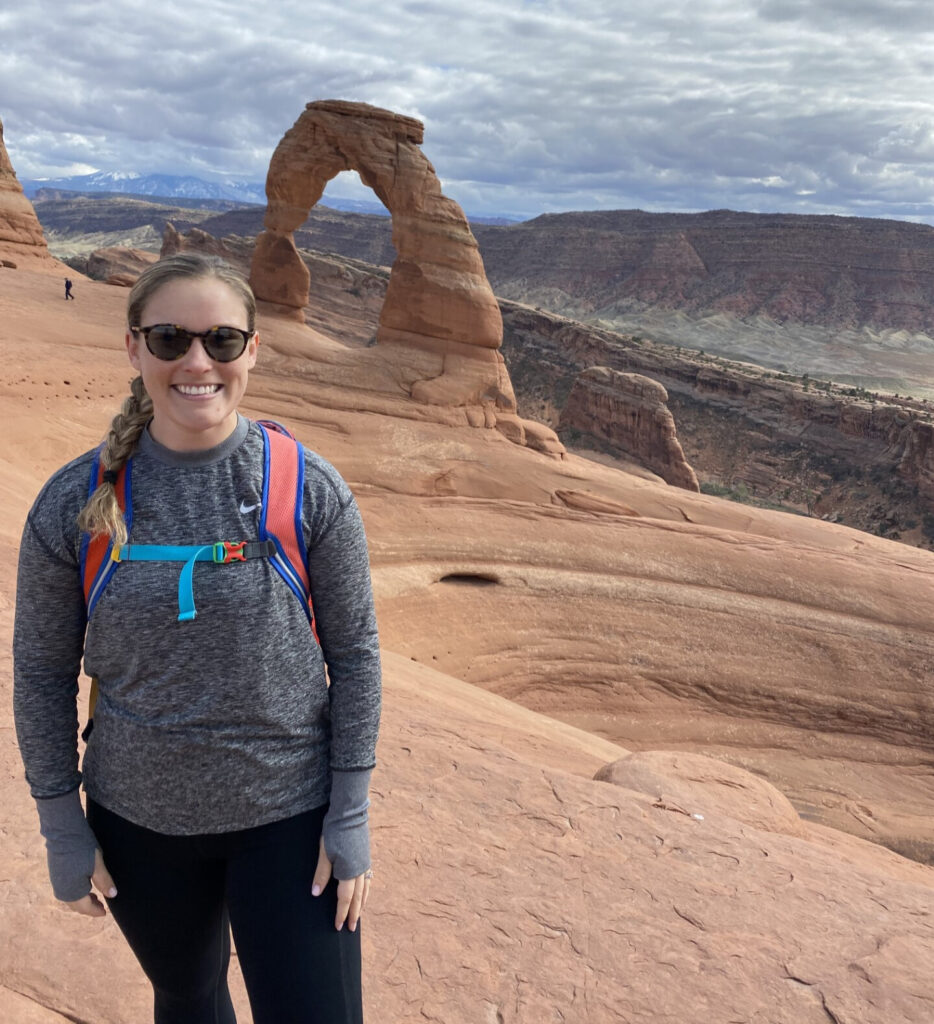Real-Life Recovery with Outpatient Clinical Manager, Ali Kitchin, LMSW
Ali Kitchin, LMSW, says, “A client may get nothing from speaker meetings, or maybe they don’t like nature walks! It has to work for them.”
Outpatient addiction treatment at Sanford Behavioral Health gives individuals the support they need while maintaining work, childcare, school, and other responsibilities and routines. Sanford West Behavioral Health Campus Outpatient Center offers individualized addiction recovery programs that work with “real-life” situations. When entering Sanford addiction treatment, each person is assessed to determine their appropriate placement; our goal is to select a clinically relevant program in the least restrictive level of care. Today, we sit down with Outpatient Clinical Manager Ali Kitchin, LMSW, to get the inside scoop.
Real-Life Recovery with Ali Kitchin, LMSW – Limelight Interview

Ali in Utah, where she worked remotely for Sanford.
“One of the biggest characteristics of real-life recovery is personalizing your recovery program to what fits YOU best. If you like yoga, do that. If you like playing Dungeons and Dragons, do that. If you are a runner, do that. Besides the recovery-focused activities (meetings, therapy, readings), having pieces of who you are represented in your daily and weekly life makes staying sober and present easier.” Ali Kitchin, LMSW
SBH – Hi Ali. What is your role at Sanford Behavioral Health?
Ali Kitchin – I am the Outpatient Clinical Manager and do what the other clinical therapists do. I carry a caseload and run groups throughout the week at different levels of care. That includes day programs (PHP), partial-day (IOP), outpatient groups, and outpatient therapy. I am also familiar with telehealth programming, having worked remotely from Utah. Additionally, I help the team of therapists. I work with Kim Van Hooser, the day programs manager, and we run clinical meetings, advise on clinical intervention, schedule and administrate, and assist in serving our clients in the best possible way.
SBH – How do you personalize your work?
Ali Kitchin – I think therapists go through “seasons” of what they find effective in client care. Recently, I have been into mind-body somatic therapy. For example, your head is full of bad thoughts and triggers, and your mind is racing. Maybe in that moment, you are not in a place to reason with yourself appropriately. In somatic therapy, we calm the body down for 5-10 minutes and get to a place where we can make better decisions. That means learning breathing and grounding skills or going for a walk until the chest is less tight before entering into a conversation or making a life decision.
SBH – Tell us about your history at Sanford Behavioral Health. Was it always in Outpatient Treatment?
Ali Kitchin – I started with Sanford in the fall of 2018. I had just graduated from Baylor in Texas and moved to Grand Rapids on a whim. I’m from California, but I always loved Michigan. Sanford Founder Rae Green was the person who made it happen. My resume had been sidelined because the recruiter I spoke to was no longer at Sanford. I got a call from Rae Green saying she had found my resume and to, “Come on down and intern, we’ll figure it out.” She was so gracious: it was one of those moments that set your trajectory.
I interned through the spring, and Sanford’s outpatient services expanded and moved to a larger facility. Being part of a policy procedure build for outpatient services was helpful. I was there through the pandemic when we honed our telehealth programs. I got married and moved to Utah, so I continued outpatient work virtually. Now I am back in person in Michigan!
SBH – You mentioned that telehealth was developed at Sanford during the pandemic. Could you talk about virtual treatment, please?
Ali Kitchin – I like virtual treatment because it offers care to people who probably would not follow up or have an option in their community. We see a lot of folks who have busy jobs and cannot spend time driving to and from treatment. We also see parents who cannot leave their children for three hours. For them, it is better to get home, stay at home, and log in at home.
In terms of engagement, virtual takes a little more effort for the therapist and client. We have to show up ready to learn, engage, debrief, and go back and forth in telehealth, whereas in person, it is just a natural part of socializing. You must be about 10% more aware and jump in when you have something to say. Anecdotally, there is a particular type of client who takes to virtual treatment. There are times when it makes sense to switch a client to in-person treatment or a higher level of care.
SBH – What are the keys to successful outcomes in recovery?
Ali Kitchin – Great question of all time. There are many factors. First, you have to look at overall health and whether this person has a safe place to live, resources, and support in their community. It is on us to be creative and use ingenuity to build individualized programs that work. I ask my clients, “Does that actually help you?” A client may get nothing from speaker meetings, or maybe they don’t like nature walks! It has to work for them. The best advice is to try every recovery option in the early days and be open, honest, and willing. The key to recovery, in general, is connecting with good recovery peers in whatever capacity you are comfortable with.
In our outpatient programs, it is not surprising to have group members say, “Bye. I love you,” as they leave. Or if someone is struggling, folks may say, “Hey, we love you.” It’s beautiful, incredible – it’s about people. The peer support for those in the depths of it is inspirational.
SBH – What about the pitfalls?
Ali Kitchin – I think everybody gets to decide their own level of risk. We can plan for risk, but the home life environment and the people around you can help or hinder recovery. Are we going into the exact same situation we were in before? Work is also a factor. If you are dealing with addiction and working an 80-hour week, mirroring pre-recovery behavior, that is highly stressful.
SBH – What makes Sanford Behavioral Health unique?
Ali Kitchin – We are person-centered, and I love that. Other treatment centers have bigger groups and less individual time. I can walk down the hall and hear staff members talking to clients about real-life things like, “How’d it go this weekend?” Or someone might say, “Did you watch the game? GO BLUE.”
SBH – What do you enjoy about your job?
Ali Kitchin – I like interacting with people, and I love working with the team. The best part about this work is being around other witty, funny, and kind therapists. Our clients are smart, diverse, and wonderful. They always have much better things to say about addiction than we could articulate. So, being around people every day is good for me.
SBH – The challenges?
Ali Kitchin – It can be a challenge when people struggle, and therapists are supposed to have the answers. Because sometimes we don’t have the answers, we can’t get into someone’s head. So, trying to figure out how to best support someone who is really struggling is the hardest part.
SBH Do you have a motto or catchphrase you use often?
Ali Kitchin – Yes. The group is not the group without the group. I also say, “You’re human,” a lot. Or “Could, would, should,” when someone thinks they should have done something differently. Lastly, recreation is relapse prevention.






